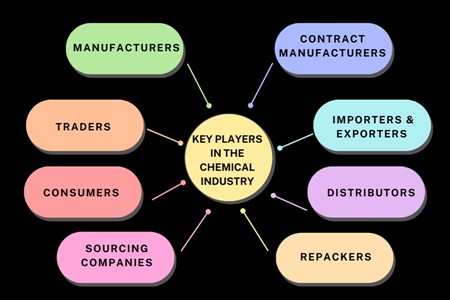
The chemical industry is vast and involves multiple stakeholders working in tandem to ensure the smooth flow of goods, from raw materials to end-users. Here's a breakdown of key terminologies and their roles in the industry.
1. Manufacturers
-
Definition: Manufacturers are the companies that produce chemicals from raw materials through a series of chemical processes. They play a foundational role in the industry by creating the base products that are further distributed or used in various applications.
-
Role: They ensure the production of high-quality chemicals like sodium oxalate, ammonium acetate, and oxalic acid, often in bulk quantities for various sectors like pharmaceuticals, agriculture, and laboratories.
2. Traders
-
Definition: Traders act as intermediaries between manufacturers and the final consumers or businesses. They typically buy chemicals in bulk and sell them to distributors or directly to customers.
-
Role: Traders are crucial in connecting manufacturers with various markets, managing the distribution and logistics of chemicals across regions and countries. Traders sell a variety of products without having to invest in manufacturing facilities.
3. Consumers
-
Definition: In the chemical industry, consumers refer to businesses or individuals that use chemicals as raw materials or inputs for their own products or processes. This includes industries such as pharmaceuticals, food processing, textiles, and more.
-
Role: Consumers are the end-users of chemicals, and they depend on traders or directly source from manufacturers to fulfill their needs. They are focused on product quality, availability, and pricing.
4. Sourcing Companies
-
Definition: Sourcing companies specialize in finding, evaluating, and acquiring chemical products for other businesses. They act as procurement partners for firms that require chemicals but do not wish to manage the complexities of dealing with multiple suppliers.
-
Role: These companies are essential in identifying reliable suppliers, negotiating terms, and ensuring timely delivery of chemicals. They streamline the purchasing process and often deal with regulatory and compliance issues on behalf of their clients.
5. Repackers
-
Definition: Repackers purchase chemicals in bulk from manufacturers or traders and repackage them into smaller quantities for resale. This often involves repackaging chemicals in different sizes to meet specific customer needs.
-
Role: Repackers add value by offering flexibility in packaging sizes, ensuring that consumers with smaller requirements can still access products that are typically sold in bulk quantities.
6. Distributors
-
Definition: Companies which act as official reseller of a particular manufacturer is an authorised distributor.
-
Role: Some large sized companies do not sell directly to consumers. Instead, they have their authorised distributor for every region who then sell it to consumers. Distributors often maintain extensive networks to ensure that chemicals are readily available in multiple regions, managing inventory and transportation logistics.
7. Importers and Exporters
-
Definition: Importers bring chemicals from foreign manufacturers into their home markets, while exporters sell domestically produced chemicals to international markets.
-
Role: These players ensure the global flow of chemicals, dealing with regulatory requirements, tariffs, and shipping logistics across borders.
8. Contract Manufacturers
-
Definition: Contract manufacturers produce chemicals for another company under a specific agreement. The hiring company may provide the formula or design, and the contract manufacturer executes the production.
-
Role: This model allows businesses to outsource production, focusing on their core activities like marketing or R&D, while the contract manufacturer takes care of the actual manufacturing process.
Why Understanding These Terms Matters
Each of these players plays a crucial role in the chemical industry, from the production of chemicals to their end use. Whether you're a manufacturer looking to expand into new markets, a trader navigating the supply chain, or a consumer ensuring you're sourcing the best quality chemicals, understanding these roles is essential.
Conclusion
By understanding these terminologies and roles, stakeholders in the chemical industry can better navigate the complexities of the supply chain, build strategic partnerships, and optimize their operations for success. Whether you are new to the industry or a seasoned professional, having a clear grasp of these terms will empower you to make informed business decisions.